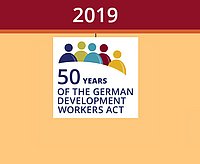50 Years of The German Development Workers Act
The German Development Workers Act came into force on 18 June 1969. Since then, over 30,000 professionals have left the country to perform development service.
On the occasion of the 50th anniversary in 2019, we have published a booklet to show the history of the Development Service and the impressive variety of its implementation. Some articles of the German edition can be found here in English.
The seven development service providers and their professionals
All seven development services contributed articles, as well as professionals from the various services.
-
AGIAMONDO: Shaping the world together
Mattes Tempelmann: Working together as equals
-
Coworkers CFI: Reflecting on the past enables us to be ready for the future
Dr. Karl-Heinz Schmalenbach: A CPI professional in Mexico
-
Dienste in Übersee: Individual human beings are at the heart of development service
Karin Döhne: Things were moving
-
Eirene: Service for peace and development
Daniel Djedouboum: Contributing to change
-
DED / GIZ: Close to the people
Inga Nagel: Not just for a limited time
-
forumZFD: Peace and conflict transformation
Christoph Bongard: From soldier to peace campaigner
-
World Peace Service: For peace and justice
Wolf Ulrich Westermann: A development cooperation worker in Zimbabwe
Downloads
-
50 years of the Reintegration Programme for returning professionals
When the first development workers returned fromabroad at the end of the 1960s, many of them had difficulty getting back into the rather inflexible German job market. In response to this, the development service agencies established the Reintegration Programme, which began offering counselling in 1968 to those considering further training or education.
-
The Development Workers Act – an international perspective
Voluntary service and voluntary work are a global phenomenon. Yet the Development Worker Act (DWA) Act is still unique – even today. In this interview Suzanne Gentges explains how the DWA contributes to German development policy to a large extent and why it is worth making an international comparison.


